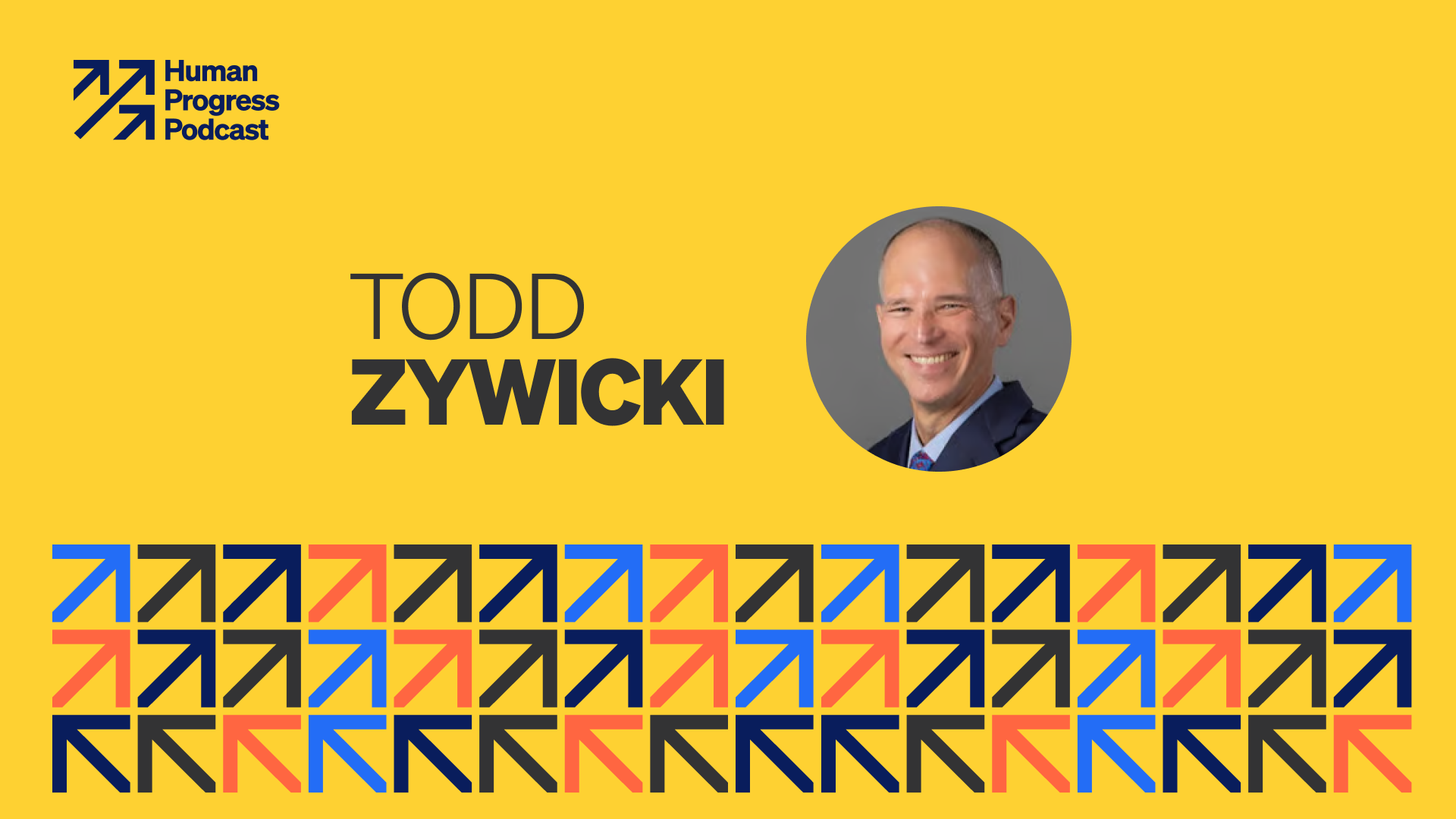Listen to the full podcast episode, in which Chelsea Follett interviews Todd Zywicki, here.
Below is an abridged transcript featuring some highlights from the interview.
Let’s start with the big picture. What exactly is ESG?
ESG stands for Environmental Social Governance. The idea is that, to do good for the world, corporations should pursue these Environmental Social Governance goals rather than just profit maximization.
To some extent, corporations have done ESG forever. Being good people is good business; treating your workers well helps them to be more productive, and conserving energy saves money. That’s unobjectionable. However, corporations, or arguably corporate managers, have started pursuing goals that are not directly related to increasing the company’s value, which has become a flash point in the last decade or two.
How big of a deal is ESG? How could it end up affecting ordinary people’s lives?
It’s a big deal, and it’s a big deal to the extent to which it’s operated through the financial system.
Financial markets are the infrastructure of the economy. Ayn Rand once famously said, “Money is a form of frozen energy, and when unthawed, it explodes.” That’s the idea: finance is a form of frozen energy, which you tap into to start a company, build a factory, buy capital equipment, and pay your employees. If, for example, banks won’t give a certain company a bank account, whether it’s their own decision or the government leans on them, that company cannot do business.
Some viewers and listeners will recall that President Biden’s initial nominee for comptroller of the currency, Saule Omarova, said she would bankrupt the fossil fuels industry in the United States.
How would she do that? Well, what they can do and are probably doing already is classify fossil fuel companies as risky investments. As a result, if a bank loans to a fossil fuel company, they have to hold back greater capital reserves, making it more expensive to lend to a fossil fuel company than to a company that invests in green energy. Using this financial lever, whether it’s through banks or whether it’s through BlackRock, you can systematically advantage some industries and companies and disadvantage others. And this very opaque process affects each of us every day, in the amount we pay for gas, the amount we pay for energy, the amount we pay for food, you name it.
Who decides the criteria for ESG? Are there clear criteria? What separates an ESG firm from another one?
You can call almost anything ESG. It’s an incoherent idea.
Say that there’s an automobile company like General Motors, and they start making electric vehicles. How does this work for ESG? Electric cars require less labor to make than traditional cars. So, if ESG says you are supposed to pursue environmental goals and make electric cars but also pursue labor goals and protect workers, what do you do? Do you continue to make old cars that preserve workers’ jobs, or do you make new cars that need much less labor and pursue some green goal?
There also isn’t any one yardstick for ESG, which explains why voluntary ESG goals don’t have a big economic cost. In practice, companies just choose the rating system that’ll give them the stamp of approval. This subjectivity leads ESG proponents to desire stricter and more binding regulations. However, when ESG becomes mandatory, we do start seeing substantial negative economic impacts.
Sri Lanka had an almost perfect ESG score right before its crisis began last year. What lessons can we learn from Sri Lanka’s tragic situation?
What ESG represents, Sri Lanka being a good example, is elite preferences that discount the struggles of ordinary people. The leadership of Sri Lanka wanted the esteem of the so-called global community and pursued it with policies that hurt the ordinary person.
Energy usage is what we call in economics “inelastic.” You can only set your thermostat so low in the winter and so high in the summer. That means poor people will end up paying more of their income to meet these requirements on energy and other environmental goals.
In the United States, that’s a working-class person trying to make ends meet who now has to pay more for everything. But think about the rest of the world. Millions of people live in huts and burn animal dung for indoor cooking fires. This is one of the leading causes of childhood asthma and other diseases. When you drive up the cost of energy or make energy less reliable to pursue other goals, that has real consequences, and it has the worst consequences for the people who live on the economic margins.
How do companies that invest in ESG perform relative to others?
The evidence is muddled on this, but companies that invest in ESG do not generally outperform companies that do not. You also find that if a company makes a higher return than other companies, they are more likely to then invest in ESG, which suggests that ESG does not make companies more profitable but is instead a so-called “agency cost” for the manager. If the company makes more money, the manager can spend it on whatever he wants. Maybe he gets a nicer private jet or office, or maybe he starts doing ESG things that gain him prestige.
One study finds that managers who underperform are more likely to mention in their next shareholder letter all the ESG things they’ve done. But when managers do a good job, they talk about returns for shareholders. Pursuing these multifarious ESG goals allows them to get away with underperforming more easily. If you have many goals, it’s harder to hold you to any one in particular.
How powerful is the trend toward ESG?
It’s very powerful, and a lot of this is just old-fashioned public choice economics.
On one side, you have government regulators who want to increase their power and force companies to pursue their ideological agenda. You also have the progressives who use ESG to accomplish their goals undemocratically. And finally, the managers who use ESG to improve their own reputations.
On the other side are just ordinary people trying to make ends meet. So, even if most people don’t approve of ESG, those in favor of it are highly organized and have an outsized ability to control society.
If ESG becomes legally entrenched, what would the ramifications be for global development and poverty?
ESG is certainly not going to help alleviate global poverty. The question will be how severe its impact will be. We’re seeing real chaos in many parts of the world, whether it’s Sri Lanka or farmers in Europe. ESG proponents are going after people’s livelihoods, and if they keep pushing, they will immiserate a lot of people on the margins, and history tells us that at some point, people say enough.
So, one scenario is it leads to widespread immiseration, and another is that people respond in ways that spawn chaos worldwide. Ultimately, the impact of ESG depends on how arrogant or dedicated its proponents are. Faced with the consequences, do they continue to push forward, or do they throttle back?
There is also the issue of democratic legitimacy. ESG goals are pursued without the effort to get a buy-in through the democratic process, and that is escalating public distrust in government and poses a real threat to our institutions.
There are also potential unintended consequences. Prosperity correlates positively with environmental protection and social goals like gender equality and tolerance. If you slow down the economy in the name of these other goals, you could undermine the goals that ESG purports to promote.
There’s nothing like economic growth, like you said. It has improved the environment, improved the social status of women, improved social equality, and allowed lower-income people to get educated and lift themselves out of poverty.
Economic growth is the best ESG program we’ve ever created. And we imperil that golden goose at our own risk.



